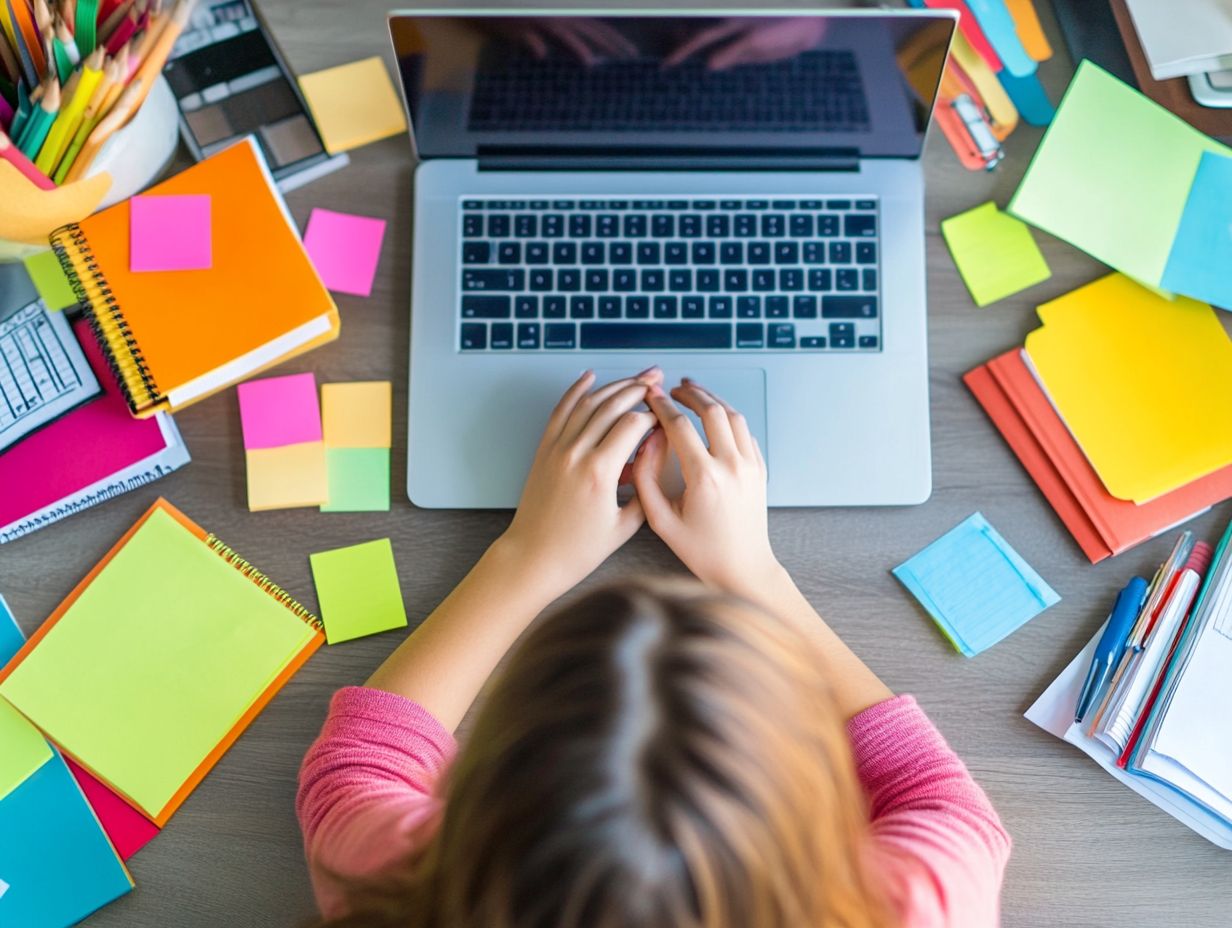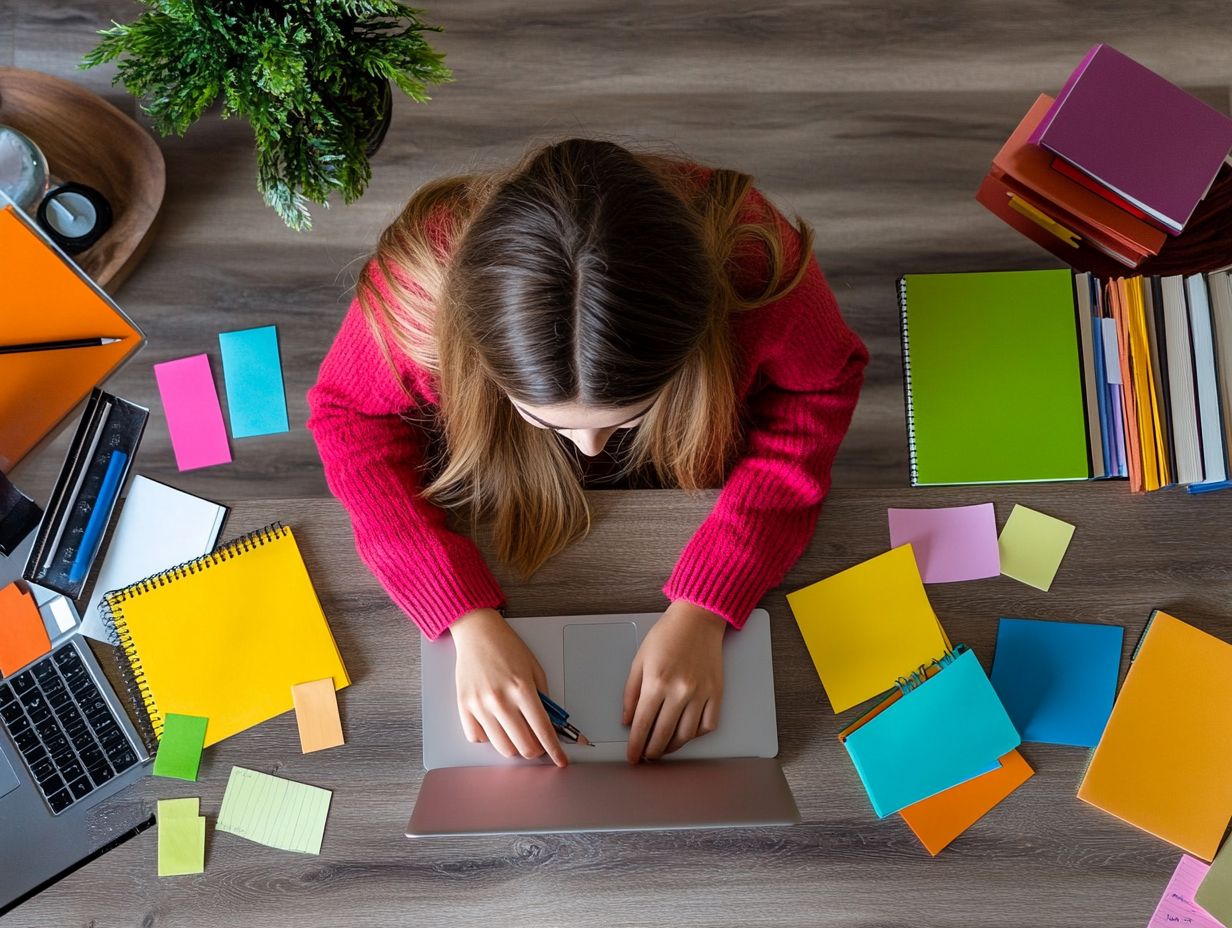5 techniques to improve note retention
In today s fast-paced world, retaining information can be quite the challenge, especially for students and professionals like you. This article delves into five effective techniques designed to enhance your note retention, ensuring that what you learn stays with you long after the lecture or meeting concludes.
By leveraging visual aids and employing active listening strategies, you ll discover practical methods that cater to various learning styles. We ll address common obstacles to retention, examine the impact of different note-taking techniques, and highlight the broader benefits of mastering these essential skills.
Ready to take your learning to the next level? Let s dive in!
Contents
- Key Takeaways:
- 1. Use Visual Aids
- 2. Create Memory Triggers
- 3. Practice Active Listening
- 4. Utilize Different Learning Styles
- 5. Review and Summarize Notes Regularly
- How Does Note Retention Affect Learning?
- Frequently Asked Questions
- What are the 5 techniques to improve note retention?
- How does summarizing help improve note retention?
- What role do visual aids play in improving note retention?
- How does active listening contribute to better note retention?
- What is spaced repetition and how does it improve note retention?
- Why is note organization important for improving note retention?
Key Takeaways:

- Use visual aids, such as diagrams or charts, to help retain information for visual learners.
- Create memory triggers, such as associations or acronyms, to make connections and improve retention.
- Practice active listening, including asking questions and summarizing, to better retain information during lectures.
1. Use Visual Aids
Incorporating visual aids into your note-taking process can dramatically boost your ability to retain and comprehend the main concepts from lectures and instructional videos, helping you succeed in school and learn better.
Techniques like color coding and concept maps allow you to create organized notes that transform complex information into something more digestible and easier to recall when exam time rolls around.
Specific types of visual aids, such as flowcharts and diagrams, are crucial for summarizing key points from the material. Flowcharts can break down processes or sequences, helping you visualize and understand the relationships between ideas more clearly.
Diagrams illustrate complex systems or concepts, offering a better grasp of how various components interact.
These tools not only enhance memory retention but also serve as invaluable study materials during class discussions or when reviewing course syllabi. By doing so, they enable you to engage more deeply with the content and foster a more interactive learning environment.
2. Create Memory Triggers
Creating memory triggers is a potent strategy in your note-taking arsenal that can significantly enhance your ability to recall information, ultimately helping you do better on tests.
By incorporating symbols, abbreviations, or key phrases into your notes, you can streamline your study process effectively.
For instance, using an asterisk to highlight important concepts or crafting abbreviations for frequently mentioned terms can dramatically reduce clutter and make reviewing far more efficient.
Developing key phrases that capture broader themes allows for quicker recall. Picture yourself using CR to signify Cause and Reaction in your history notes; this simple trigger can help you remember entire events and their implications when exam day arrives.
These techniques transform information into memorable snapshots, making retrieval under pressure not just possible but effortless.
3. Practice Active Listening
Practicing active listening during lectures and class discussions is vital for effective note-taking. This approach allows you to capture crucial main ideas and concepts in your notes, ultimately paving the way for greater academic success.
By focusing on keywords spoken by the lecturer, you can identify the core concepts that the speaker emphasizes, making it easier to filter out unnecessary details. Engaging with the speaker whether by asking questions or paraphrasing points not only clarifies your understanding but also reinforces your retention of information.
This interaction helps you create clearer, more detailed notes that truly reflect your grasp of the study material.
As a result, you’re not just jotting down words; you’re synthesizing information in a way that fosters a deeper connection with the content, significantly enhancing your overall learning experience.
In conclusion, employing these effective note-taking techniques for test prep can greatly improve your note retention and enhance your learning experience. Start applying them today to see the difference!
4. Utilize Different Learning Styles

Utilizando diferentes estilos de aprendizaje en tu enfoque de toma de notas puede atender tus preferencias individuales y mejorar tu comprensi n. Esto apoya en ltima instancia tu xito acad mico a trav s de estrategias de estudio m s efectivas.
Por ejemplo, el m todo de la oraci n te permite anotar ideas clave en un formato lineal. Esto puede ser particularmente beneficioso si prefieres la recolecci n de informaci n directa.
El sistema de Notas Cornell divide el contenido en segmentos concisos. Integra pistas y res menes que ayudan a revisar el material m s tarde.
En la era digital de hoy, puedes elegir herramientas en l nea que facilitan la organizaci n y el acceso a tus notas. Otros pueden descubrir que la experiencia t ctil de las notas escritas a mano mejora su retenci n.
Al explorar y adaptar estos diversos m todos, puedes alinear tus h bitos de toma de notas con tus estilos de aprendizaje nicos. Esto mejora significativamente tu capacidad para recordar y conectar conceptos.
5. Review and Summarize Notes Regularly
Regularly reviewing and summarizing your notes boosts memory retention. This practice solidifies your understanding of key concepts covered during lectures.
Testing yourself helps you actively engage with the material. This leads to deeper comprehension and long-lasting knowledge.
Creating structured study guides from organized notes not only condenses information but also facilitates quick revisions. Focus on summarizing main ideas to enhance recall.
The more you internalize the material, the better prepared you ll be! Boost your confidence and shine during exams!
How Does Note Retention Affect Learning?
Note retention is crucial for your learning journey. It directly affects your ability to recall and apply information, shaping your academic success across various subjects and disciplines.
Employing effective note-taking methods, such as the Cornell method, mind mapping (a visual way to organize information), or the outline technique, can greatly enhance retention. Additionally, incorporating 5 ways to use mnemonics for better recall can help in organizing information visually or hierarchically, creating a structured understanding of complex topics.
This clarity not only aids your memory but also gives you the power to engage more actively in discussions. Regularly reviewing your notes helps deepen your connections with the material, fostering long-term retention that positively influences your overall academic performance.
What Are the Common Obstacles to Note Retention?
Various common obstacles to note retention can significantly hinder your ability to effectively recall and utilize information. This ultimately impacts your overall learning experience and academic performance.
These challenges often show up as a lack of engagement during lectures. This leads you to drift into passive listening instead of actively participating.
Poor organization of your notes can leave you scrambling to locate critical information at the most inconvenient moments. Ineffective study strategies might push you toward cramming and burnout rather than fostering true understanding.
To conquer these hurdles, consider incorporating structured note-taking techniques like the Cornell method or mind mapping into your routine. Engaging in active learning practices, such as joining collaborative study groups or teaching the material to your peers, can deepen your grasp of concepts.
These practices encourage meaningful connections that enhance your ability to recall information!
Want to Improve Your Note Retention?

Improving your note retention requires a mix of effective strategies. This includes not just summarizing your notes but also using self-testing methods that reinforce your learning and memory.
Consider incorporating methods like teaching others. This approach can dramatically enhance your understanding and retention of information. When you explain concepts to your peers, you engage with the material on a deeper level, solidifying your grasp in the process.
By applying principles from educational psychology, such as spaced repetition and active recall, you can further embed knowledge over time. Establishing a well-organized structure in your note-taking utilizing bullet points, headings, and visuals makes your notes more accessible and easier to review. This thoughtful organization fosters better retention and recall when it s time for assessments.
How Can Note-Taking Techniques Impact Note Retention?
The choice of note-taking techniques greatly influences your ability to retain information. Structured methods like the Cornell Notes or flowcharts can enhance your organization and understanding of study material.
For example, the Cornell method prompts you to divide your notes into key ideas and summaries, encouraging active engagement with the content. This engagement improves your memory recall when exams roll around.
Similarly, utilizing flowcharts allows you to visualize relationships between concepts, making abstract ideas more concrete and easier to grasp.
Well-organized notes make reviewing easy and enjoyable, leading to improved academic performance. You ll find it simpler to connect ideas and concepts, ultimately paving the way for higher grades and a deeper understanding of the subject matter.
Unlock Amazing Benefits of Improving Note Retention!
Improving your note retention can unlock amazing benefits, from a deeper understanding of the material to enhanced academic success and a boost in confidence during exams and class discussions.
When you grasp concepts more thoroughly, you re more likely to engage actively in classroom activities, sparking richer discussions with both peers and instructors. This active participation cultivates a collaborative learning environment where ideas flow freely, igniting critical thinking and creativity.
As your retention improves, you may develop a stronger sense of ownership over your educational journey. This can fuel your motivation and spark a desire to explore subjects more deeply.
These psychological benefits not only enhance your overall learning experience but also play a pivotal role in paving the way for long-term academic achievements.
How Can Note Retention Be Measured and Tracked?
Measuring and tracking your note retention is vital for understanding your learning progress and identifying areas needing extra attention.
To effectively assess how well you re retaining information, consider employing several methods:
- Self-assessments provide a personalized approach, enabling you to reflect on your understanding and pinpoint specific gaps in your knowledge.
- Quizzes act as both evaluation tools and motivators, encouraging you to review regularly while reinforcing what you’ve learned.
- Monitoring your performance on practice tests can offer valuable insights into your retention over time.
You can also use academic resources like study guides, tutoring sessions, and online platforms to enhance your efforts, equipping you with the tools necessary for continuous improvement and a deeper grasp of the material.
Frequently Asked Questions

Here are some common questions about note retention and strategies for improvement:
What are the 5 techniques to improve note retention?
The 5 techniques to improve note retention are summarizing, visual aids, active listening, spaced repetition, and note organization.
How does summarizing help improve note retention?
Summarizing involves condensing information into key points, which helps to process and understand the material better. This makes it easier to remember and retain the information.
Don t miss out on mastering your material! Start applying these techniques today for immediate benefits.
What role do visual aids play in improving note retention?
Visual aids like diagrams and images simplify complex information.
They help you remember material by creating clear, memorable visuals.
How does active listening contribute to better note retention?
Active listening means being fully engaged in what you hear.
This focused attention helps you process and retain information better than passive listening.
What is spaced repetition and how does it improve note retention?
Spaced repetition involves reviewing material at increasing intervals.
This technique strengthens memory by revisiting information over time.
Why is note organization important for improving note retention?
Organizing notes creates a clear structure.
This clarity makes it easier to understand and review the material later.





